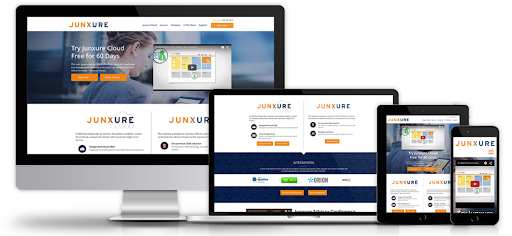As a web developer and designer, I understand the importance of choosing the right Content Management System (CMS) for your website. Drupal, an open-source CMS, has gained popularity among web designers and developers for its robust features and flexibility. However, like any other CMS, Drupal has its own set of questions and concerns.
In this blog, we will address some of the common FAQs related to Drupal website design, including Drupal migration service and how to migrate from WordPress to Drupal.
1. What Is Drupal And Why Should I Use It For Website Design?
Drupal is a powerful, open-source CMS that allows you to create and manage content for your website. It offers a wide range of features and modules that make it highly customizable and suitable for complex websites with different content types. Drupal is known for its flexibility, scalability, and security, making it a popular choice among large organizations, government agencies, and businesses. With Drupal, you can create websites with diverse functionalities, including blogs, e-commerce, social networking, and more.
2. Can I Migrate From WordPress To Drupal And How Can I Avail Of Drupal Migration Service?
Yes, you can migrate from WordPress to Drupal. Drupal provides a built-in migration module called “WordPress Migrate” that allows you to import content, users, and other data from WordPress to Drupal. However, the migration process can be complex and requires technical expertise. To ensure a smooth and seamless migration, it is recommended to avail of Drupal migration services from experienced web developers who are familiar with the process. Drupal migration service providers can help you with data migration, theme customization, module configuration, and overall website set up to ensure a successful transition from WordPress to Drupal.
3. What Are The Advantages Of Using Drupal Over Other Cms Platforms For Website Design?
Drupal offers several advantages over other CMS platforms for website design. Some of the key advantages include
(i). Flexibility
Drupal allows you to create and manage different types of content, such as articles, images, videos, events, and more, making it highly flexible for diverse website requirements.
(ii). Customization
Drupal provides a wide range of themes, templates, and modules that can be customized according to your website’s design and functionality needs, giving you complete control over your website’s look and feel.
(iii). Scalability
Drupal is scalable and can handle websites with large amounts of content and high traffic volumes, making it suitable for websites with growing needs.
(iv). Security
Drupal has a strong security framework that includes regular security updates, code reviews, and community-driven security practices, making it a secure CMS option for websites that handle sensitive data.
4. Is Drupal Suitable For Small Businesses Or Only For Large Organizations?
While Drupal is commonly used by large organizations and enterprises, it is also suitable for small businesses. Drupal’s flexibility allows you to create websites of all sizes, from simple blogs to complex e-commerce websites. Drupal’s scalability ensures that your website can grow as your business expands. Moreover, Drupal’s robust security features make it a reliable choice for businesses that handle customer data and want to ensure their website’s security.
5. What are the key features of Drupal that make it stand out for website design?
Drupal offers a plethora of features that make it stand out for website design. Some of the key features include
(i). Content Management
Drupal provides a powerful content management system that allows you to create, edit, and organize content in a highly customizable way, including support for multi-language content.
(ii). Customization
Drupal allows you to create custom content types, fields, and views, giving you complete control over your website’s design and functionality.
(iii). User Management
Drupal offers robust user management features, allowing you to create and manage user accounts with different roles and permissions, ensuring secure access to your website’s backend.
(iv). Extensibility
Drupal’s modular architecture allows you to extend its functionality with thousands of contributed modules, providing endless possibilities for customization and enhancing your website’s features.
(v). SEO-Friendly
Drupal is designed with SEO best practices in mind, allowing you to optimize your website for search engines and improve your website’s visibility in search results.
(vi). Responsive Design
Drupal offers responsive design capabilities, allowing you to create websites that are mobile-friendly and accessible on various devices, including smartphones and tablets.
6. What Are Some Considerations To Keep In Mind When Using Drupal For Website Design?
While Drupal offers numerous benefits for website design, there are some considerations to keep in mind
(i). Technical Expertise: Drupal is a complex CMS that requires technical expertise to fully utilize its features and customization options. If you are not familiar with web development concepts and coding, you may need to hire a professional web developer or avail of Drupal migration service to ensure a successful website design.
(ii). Learning Curve: Drupal has a steeper learning curve compared to other CMS platforms, and it may take some time to get familiar with its interface, features, and terminology.
(iii). Maintenance and Updates: Like any other CMS, Drupal requires regular maintenance and updates to ensure security and performance. You need to be prepared to invest time and effort in keeping your Drupal website up-to-date with the latest security patches and module updates.
(iv). Budget: While Drupal is free and open-source, availing of Drupal migration service or customizing your website with premium themes and modules may incur costs. You need to budget accordingly for any additional expenses related to your Drupal website design.
Conclusion
In conclusion, Drupal is a powerful CMS that offers flexibility, scalability, and security for website design. Whether you are a small business owner or a large organization, Drupal can be a suitable choice for your website design needs. However, it is important to consider factors such as technical expertise, learning curve, maintenance, and budget when opting for Drupal. If you are new to Drupal or planning to migrate from WordPress to Drupal, it is recommended to avail of Drupal migration services from experienced web developers to ensure a smooth and successful transition. With its extensive features and active community, Drupal can be a reliable CMS for creating robust and feature-rich websites.





